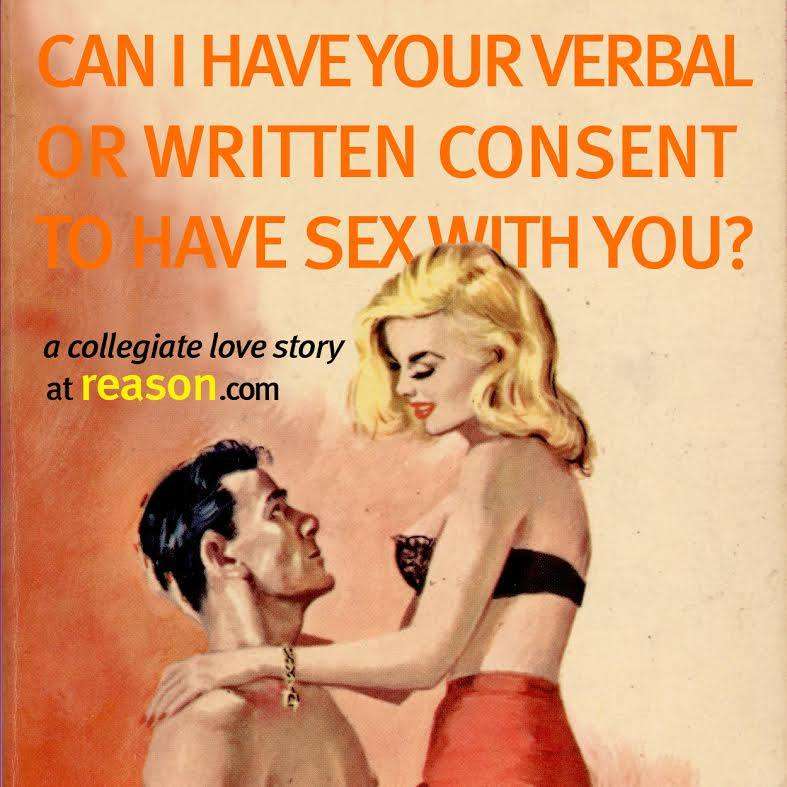Can Someone Just Invent an 'I Consent to Sex' iPhone App Already?
Consensual sex? There's an app for that. One day soon. Hopefully.


Over at Slate, Amanda Hess came to the defense of legislation—currently under consideration by the California State Assembly—that would pressure colleges to police their students' sexual activities.
California Senate Bill 967 would force state universities to strictly define consensual sex between students as an "affirmative, unambiguous, and conscious decision." It would also clarify that "lack of protest or resistance does not mean consent, nor does silence mean consent," and that the person "initiating the sexual activity" is responsible for obtaining consent.
This legislatively-enforced definition of consent is much needed, wrote Hess:
This standard improves on the old "no means no" model in a number of ways. A partner who is asleep or passed out can't say "no." Neither can a partner who's frozen in shock or fear when an encounter escalates into an assault. Victims who are threatened with sexual assault aren't always equipped to respond in rape prevention talking points. Just like with any other violent physical assault, many victims respond by shutting down, going silent, or laying motionless, hoping not to anger their attackers further, or disassociating from the attacks as an attempt at self-preservation. Also, consenting to sex one time doesn't mean consenting to sex any other time. And consenting to one act (like vaginal intercourse) doesn't imply consent for all other acts (like anal sex). Having sex with a person who is lying limply on a bed is not consensual, unless that person happens to be really, really into that—but that's a situation that requires a conversation, not an assumption.
So are affirmative consent laws a good idea? If they are broad enough to include nonverbal cues, I think so. If we can admit that enthusiastic consent is often communicated in body language or knowing looks, then we must also accept that the lack of consent doesn't always manifest itself in a shouted "no" or "stop," either. It shouldn't be the sole responsibility of the uninterested party to speak up during a sexual encounter. If you think it's easy for a person to just say no, then why would it be so hard for his or her partner to just ask?
My only substantial quibble with this definition is the "person initiating" clause. Is it always so clear that one person is initiating sex with another? Isn't the decision to have sex sometimes mutually arrived at by both parties?
Setting that aside, maybe it's a good idea for the California legislature to broaden the parameters of sexual assault. Maybe "only yes means yes" is a better standard than "no means no," and it is desirable for cultural attitudes about consensual sex to shift in that direction.
But why on earth should that involve universities? Rape is a crime, not an academic offense. I'm open to the argument that the criminal justice system should navigate sexual assault cases differently, but I don't accept that there should be some extralegal method of punishing accused rapists where the burden of proof is lower, due process is nonexistent, and he said/she said is often an automatic loss for the accused. The punishments are not as severe as they are under the normal justice system, sure, but expulsion is still a harsh sentence (synonymous with the loss of thousands of dollars toward a now unobtainable degree), given the conviction process is handled by people totally unequipped to fairly judge such matters.
The legislature is telling state universities to more aggressively involve themselves in their students' sex lives. Given administrators' track records, there is little reason to think that either victims or the accused will be well served by such mandate.
Ultimately, I'm counting on the free market to work its magic and provide a sensible and convenient method of demonstrating mutual consent. Several writers have suggested an iPhone app that allows users to clearly consent to sex—maybe they would have to input a password and then touch phones, or something?—would do the trick.
Consensual sex? There's an app for that. One day soon. Hopefully.


Show Comments (174)